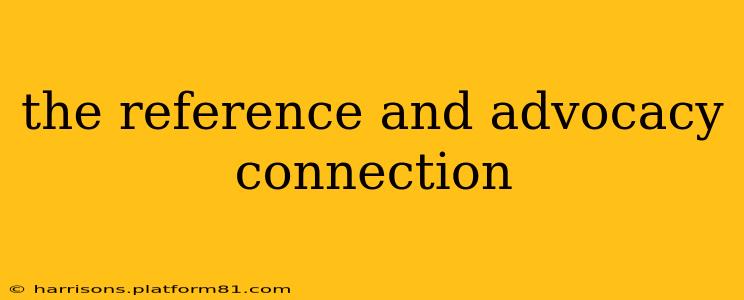In today's competitive job market, having a strong professional network is crucial. While a compelling resume and impressive skills are essential, securing your dream job often hinges on the power of references and advocates. Understanding the intricate connection between these two elements is key to unlocking opportunities and accelerating your career progression. This article explores the vital relationship between references and advocacy, offering strategies to cultivate both for long-term professional success.
What is the difference between a reference and an advocate?
This is a fundamental question many professionals grapple with. While both contribute to your career advancement, their roles differ significantly.
A reference provides factual information about your skills, experience, and work ethic. They typically respond to inquiries from potential employers, verifying your claims and offering insights into your performance. References are usually past supervisors, colleagues, or professors who can attest to your capabilities.
An advocate, on the other hand, goes beyond simply verifying information. They actively promote your skills and accomplishments to others, often acting as champions for your career goals. Advocates may proactively suggest you for opportunities, vouch for your abilities in meetings, or provide mentorship and guidance. They are invested in your success and willing to expend effort to help you achieve it.
How can I cultivate strong references?
Building a network of strong references requires proactive effort and relationship building.
-
Maintain positive professional relationships: Cultivate strong relationships with colleagues, supervisors, and mentors throughout your career. Demonstrate professionalism, reliability, and a positive attitude in all your interactions.
-
Seek feedback regularly: Don't wait until you need a reference. Regularly seek feedback from supervisors and colleagues on your performance. This allows you to address any weaknesses and build a stronger track record.
-
Keep in touch: Stay connected with past colleagues and supervisors after leaving a role. Send occasional updates, connect on LinkedIn, or reach out for informational interviews. This helps maintain your professional relationships and strengthens your network.
-
Provide references with information: When you ask someone to be a reference, provide them with your resume, a cover letter, and details about the role you're applying for. This gives them the context they need to write a strong recommendation.
How can I find and cultivate professional advocates?
Finding and fostering professional advocates requires a more strategic approach, emphasizing genuine connection and mutual benefit.
-
Identify potential advocates: Think about individuals who have witnessed your skills and achievements and who genuinely believe in your potential. This could include mentors, supervisors, influential colleagues, or even clients.
-
Build genuine relationships: Focus on building strong, mutually beneficial relationships with these individuals. Offer your support and expertise whenever possible, demonstrating your commitment to collaboration.
-
Seek mentorship: Actively seek out mentorship opportunities to learn from experienced professionals who can guide and support your career development. Mentors often become powerful advocates.
-
Showcase your accomplishments: Regularly communicate your accomplishments and career goals to your network. This keeps you top-of-mind and allows potential advocates to understand your aspirations and capabilities.
What are the key benefits of having both strong references and advocates?
The synergistic effect of strong references and advocates is profound:
-
Increased job opportunities: Advocates can open doors to opportunities that might otherwise remain hidden, providing insider access to job openings and networking events. Strong references solidify your candidacy once you've secured an interview.
-
Improved career progression: Advocates can champion your promotion, provide guidance, and help you navigate career challenges. Strong references back up your achievements and qualifications.
-
Enhanced credibility: A combination of strong references and active advocacy significantly enhances your credibility and reputation within your industry.
-
Greater confidence: Knowing you have a strong support network boosts your confidence and allows you to approach opportunities with greater assurance.
How can I make my references and advocates more effective?
Maximize the impact of your network by:
-
Providing context: Give your references and advocates as much information as possible about the roles you're applying for, tailoring their input to the specific requirements.
-
Express gratitude: Always express sincere gratitude to your references and advocates for their support.
-
Regularly update your network: Keep your network updated on your progress and career aspirations. This strengthens the relationship and ensures they can effectively advocate for you.
By understanding and proactively cultivating the relationship between references and advocacy, you can significantly enhance your career prospects and achieve long-term professional success. Remember, building these relationships requires consistent effort, genuine connection, and a commitment to mutual support.
